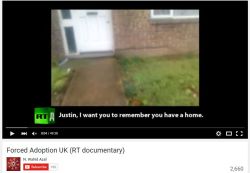 This 170-page report has been produced by UNICEF in conjunction with the International Parliamentary Union – international bodies with worthy aims – but not enough effectiveness, it seems – and even maybe part of the problem, as some related articles suggest…
This 170-page report has been produced by UNICEF in conjunction with the International Parliamentary Union – international bodies with worthy aims – but not enough effectiveness, it seems – and even maybe part of the problem, as some related articles suggest…
If only we could address what’s dishonest with our money system. The sexual violence resulting from male frustration might at least diminish…
This quotation is part of the UNICEF report on Child Protection, especially for Parliamentarians:
History will judge us harshly if we refuse to use our knowledge, our resources and our will to ensure that each new member of the human family arrives into a world that honours and protects the invaluable, irreplaceable years of childhood. – Carol Bellamy, Executive Director of UNICEF
In particular, here is a Checklist for ACTION by Parliamentarians on page 27:
What parliaments and their members can do:
National legislation sets the principles, objectives and priorities for national action to ensure child protection and creates the machinery for carrying out that action. It is therefore crucial that Members of Parliaments take the following steps :
- Ensure that Parliament adopts national legislation that corresponds to the international legal instruments to which your State is party.
- Ensure that existing legislation is reviewed – by the competent services of Government, a special parliamentary committee or other official body – to determine whether its provisions are consistent with the Convention on the Rights of the Child.
- Where necessary, make use of parliamentary procedure to ensure that the Government sends draft legislation, or amendments to existing legislation, to Parliament.
- Do not hesitate to enter into contact, consult and cooperate with civil society groups working on child protection issues when developing national legislation, so as to have access to comprehensive data and experience. Children and youth should also be involved in the process.
- Make sure that national legislation is accompanied by the corresponding rules and administrative measures to ensure adequate implementation.
- Make sure that implementing costs of the new legislation are taken into account in the national budget.
- Exchange best practices with neighbouring and other countries.
Page 33 refers to Advocacy which we as the Association of McKenzie Friends have been practising:
As representatives of the people, parliamentarians are public opinion leaders. As such, they are well placed to promote issues of child protection within both parliaments and communities. This unique role as elected representative between the people and government provides members the opportunity, authority, legitimacy and responsibility to be advocates against violence, abuse and exploitation.
In addition, through the framework of their own party manifest, parliamentarians can mobilize support around these issues.
Parliamentarians can use their voice to break the silence around child protection issues. Many issues relating to protection can be very sensitive, hidden behind stigma, secrecy, shame or corruption. They are taboo subjects, particularly where they relate to sex or to religion.
This silence is a barrier to progress on child protection; it is impossible to mobilize action on something people do not accept exists.
By raising issues of child protection in public and showing leadership in facing up to difficult issues, parliamentarians can overcome one of the main obstacles to addressing protection issues in many countries.
Chapter 8 starting on page 66 covers Sexual Exploitation and its different aspects:
- child prostitution
- sex tourism
- child pornography.
A comprehensive programme against the sexual exploitation of children should include components on prevention; detection, reporting and intervention; reduction of demand and the prosecution of offenders; and the proper treatment of victims and compensation. It should be based on empirical research and designed for implementation on the local and national level. It should also include international cooperation, in particular in the prevention and repression of trafficking for purposes of prostitution, pornography and sex tourism.
The chapter Law reform suggests:
- neither filing of a complaint nor prosecution of an offence requires the permission of the parents of the victim!
- Every effort is made to balance the right of the accused to due process with the need to avoid re-victimization of child victims (for example, through laws that allow videotaped declarations of the victim to be accepted as evidence or allow child witnesses to be cross-examined in a child-friendly setting through the intermediary of a court-appointed specialist).
Maybe you use http://www.WriteToThem.com to alert your MP to this handbook and to the Commons debate that Lucy Allan MP and Alan Johnson MP had initiated on January 7, 2016?












